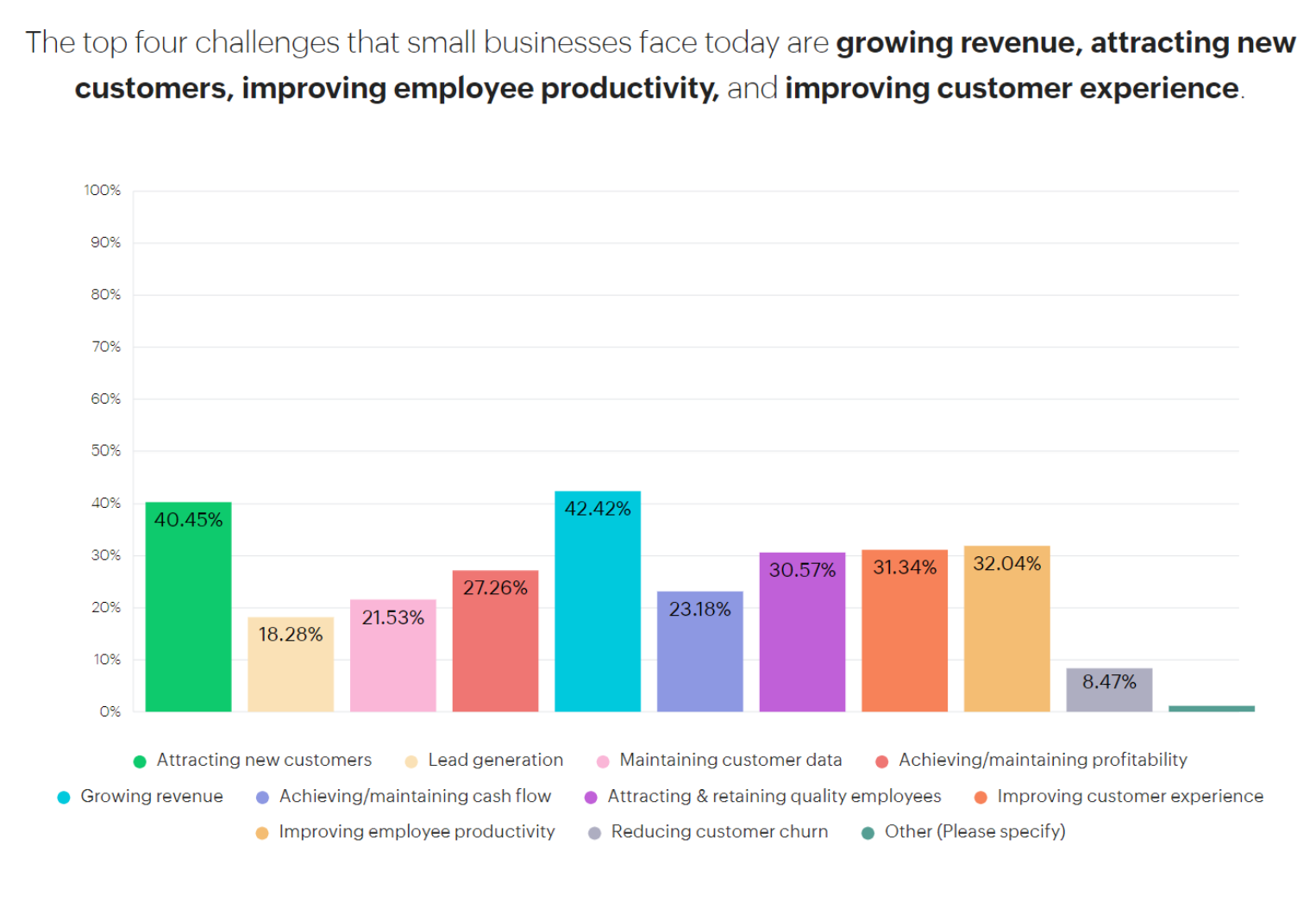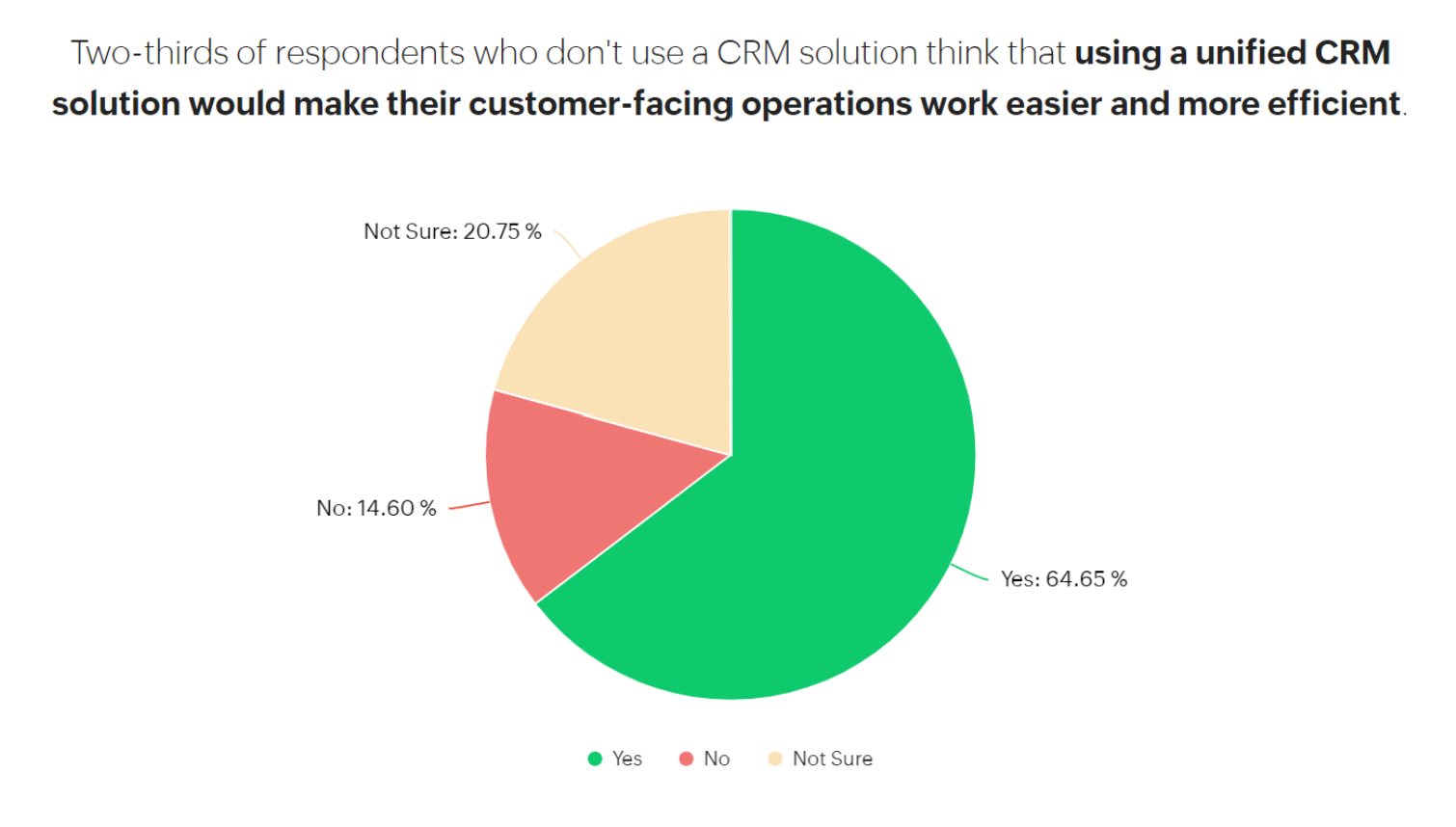For small businesses, success often hinges on the ability to juggle numerous tasks and wear multiple hats. From managing day-to-day operations to nurturing customer relationships, every aspect of a small business counts. How the business manages these operations and the solutions they choose to use to help with the process, also contribute towards this success.
SMB Group recently conducted a survey for Bigin by Zoho CRM to look at the priorities and challenges SMBs face in managing customer-facing operations. For this study, we surveyed over 1,500 U.S. small businesses (defined as companies with 100 employees or fewer). The “2023 State of Customer Operations for U.S. Small Businesses” report, offers insights into how Customer Relationship Management (CRM) systems can be a game-changer for small enterprises.
Top Business and Customer Facing Challenges
Small businesses told us that three of the four top overall business challenges they face are customer-centric: attracting new customers, growing revenues, and improving customer experience. While not explicitly customer-focused, improving employee productivity, which is a prerequisite for growth, rounded out the top four.
When it comes to customer-specific challenges, respondents noted that personalizing interactions for different customers, securing repeat business, and converting prospects into sales are the most pressing.
The connection between top business, customer, and employee productivity challenges is clear. Customers lie at the heart of small business success, and engaged and efficient employees are essential to building and nurturing customer engagement. Providing employees with the right tools to automate routine aspects of customer operations is not only critical to operate more efficiently, but develop a better understanding of their customers’ needs so employees can better serve them.
Using a Unified CRM Solution Helps Improve Customer Operations and Experiences
Out of all the small businesses participating in the survey, 44% said they use a unified CRM solution. These businesses are about twice as likely to be satisfied with their approach to managing customer-facing operations than those using other methods. Respondents ranked improving customer experience (41%), improving data quality (39%), and more/better insights (34%) as the top three benefits of using a unified CRM.
Furthermore, those using a unified CRM also expressed significantly higher satisfaction levels than their non-CRM counterparts. They were significantly more likely to rate their customer operations as very efficient than non-CRM users.
This isn’t surprising. A unified CRM solution provides multiple functions such as contact management, marketing, sales, and service on one, integrated platform. Once information is entered in one part of the system, it is replicated throughout, eliminating the need for redundant data entry and conflicting information between different applications. With everything in one place, it’s easier to automate and manage different tasks and workflows across the customer life cycle.
Why Don’t More Small Businesses Use CRM?
The 56% of small businesses that don’t use a unified CRM system rely on a combination of spreadsheets, email, personal productivity tools, point solutions, and/or pen and paper to manage customer-facing operations.
However, two-thirds of these non-users told us that they think that a unified CRM solution would help make things easier and more efficient. In other words, they “get it” but haven’t been able to surmount adoption obstacles—or overcome inertia.
The reasons they haven’t made the switch are varied. The top three things that have prevented them include being satisfied with their current system, the belief that their company is too small for CRM and employee resistance to learning new software. They also cited time constraints, budgetary concerns, and fear that it would be too hard to use as key obstacles.
Choosing the Right CRM
The good news is that 51% of non-users are considering deploying a unified CRM solution—and one that addresses these obstacles They’re prioritizing ease of use (53%), time efficiency (47%), quick deployment (39%), and value (36%) as they evaluate options.
And while they’re looking for value, they are willing to invest an average of roughly $100-200 per month.
Fortunately, CRM solutions such as Bigin by Zoho CRM that are specifically tuned to these requirements can help small businesses reap the advantages of CRM on their own terms.
Beyond the Obvious Benefits
There’s another intrinsic advantage to unified CRM—AI, or artificial intelligence. 78 percent of small businesses are interested in keeping up with AI trends and believe that AI will add many benefits to customer-related applications, including these top three: providing better access to information for faster decision-making (36%); helping to reduce/eliminate repetitive tasks (35%); helping to spot potential problems/anomalies (35%).
Using AI within a unified platform offers a cohesive and holistic view of customer data, enabling more comprehensive insights and analytics, and better-integrated workflows for more consistent customer experiences. This contrasts with using multiple point solutions, which will likely result in fragmented data and limited interoperability, hampering the ability to provide cohesive insights and processes.
Perspective
These survey results underscore the crucial role that unified CRM systems play in propelling small businesses toward success. The benefits—including improved customer experiences, enhanced data quality, and valuable insights for decision-making—are evident and will continue to drive increasing adoption amongst non-users.
As they consider alternatives, priorities will include ease of use, efficiency, and quick deployment, and whether the solution is tailored to the needs of small businesses. In addition, businesses will want to consider how different vendors are and are planning to embed AI capabilities into their offerings, as this functionality amplifies CRM benefits.
Ultimately, small businesses need to overcome inertia and embrace unified CRM to overcome challenges, drive growth, and achieve sustained success in their customer operations.
© SMB Group 2023


